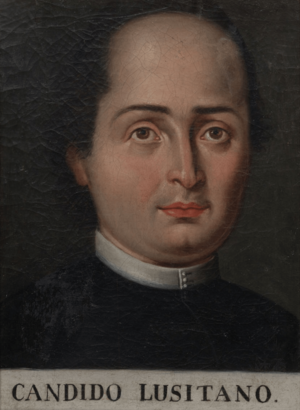Francisco José Freire facts for kids
Francisco José Freire (born January 3, 1719 – died July 5, 1773) was an important Portuguese historian and philologist. A philologist is someone who studies languages, especially their history and how they are used. Freire was born in Lisbon, the capital city of Portugal.
He was a member of a religious group called the monastic society of St Philip Neri. He was also a very active member of a literary group known as the Academy of Arcadians. In this group, he used a special pen name, or nickname, which was Cândido Lusitano.
Contents
Improving Portuguese Writing
Francisco José Freire worked hard to make Portuguese writing better. He helped improve the style of Portuguese prose, which is like everyday written language, not poetry. He wanted to make it clearer and more elegant.
He also tried to change Portuguese poetry by translating a famous poem called Ars poetica by Horace. This poem was about how to write good poetry. However, his efforts to change poetry were not as successful as his work on prose.
His Ideas on Writing
Freire wrote a book called Maximas sabre a Arte Oratoria (1745). In this book, he shared his ideas about what he thought was wrong with the way Portuguese prose was being written at the time. He believed that the writing style was not very good.
The book also included a timeline of events in Portugal. This timeline was almost like a history book about the country's society and physical changes over time.
His Most Famous Work
Freire's most well-known book is Vida do Infante D. Henrique (1758). This title means "Life of Prince Henry." This book is about Henry the Navigator, a famous Portuguese prince who helped start the Age of Discovery.
This work made Freire one of the best Portuguese historians. It was so important that it was even translated into French in 1781.
Other Works
Besides his famous history book, Freire also wrote other things. He created a "poetical dictionary" (Diccionario poetico). This was a special dictionary related to poetry.
He also translated a play called Athalie (1762) by a French writer named Jean Racine. Many years after his death, in 1842, his thoughts on the Portuguese language were published. This book was called Reflexions sur la langue portugaise. It was published by a group in Lisbon that wanted to promote useful knowledge.
Later Life and Death
Francisco José Freire passed away in Mafra on July 5, 1773. He left behind a legacy of important writings that helped shape Portuguese literature and history.
See also
 In Spanish: Francisco José Freire para niños
In Spanish: Francisco José Freire para niños
 | Roy Wilkins |
 | John Lewis |
 | Linda Carol Brown |


